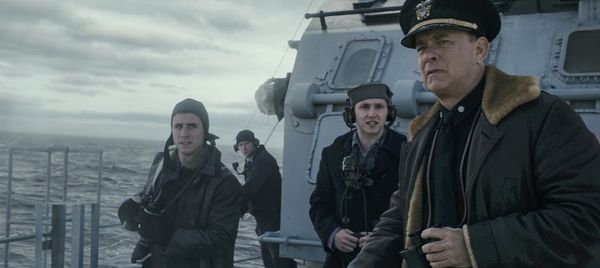Eye For Film >> Movies >> Greyhound (2020) Film Review
Greyhound
Reviewed by: Jennie Kermode

Tom Hanks' third foray into full length feature scriptwriting, Greyhound has the character of a passion project. It displays a deep understanding of context which will strongly appeal to viewers with navy backgrounds, demonstrating that Hanks has done his research, but there's not enough going on beyond that to make a good connection with more general audiences. As a consequence, whilst it's still a serviceable thriller, it never achieves the greatness that the source material might lead one to hope for.
The setting is the northern Atlantic Ocean, a few months after the US entry into World War Two. Hanks plays Captain Ernest Krause, a quiet, resourceful yet inexperienced man whose first command was always going to be risky, and who has a sweetheart back home (Elisabeth Shue) who has hinted that she'll marry him if he returns - the sort of detail likely to lower viewer expectations of his survival. The situation he finds himself in, however, is not only dangerous for him but for hundreds of men under his command.

Significant military advantages rarely last for long. This was one of those rare periods in history when attackers at sea very much had the advantage over those seeking to defend. in the middle of the ocean, the 'black pit' out of reach of aircraft surveillance from either side, German U-boats roamed in packs, their presence extremely difficult to detect, sinking any Allied ships they could find. It's through this territory that Krause's ship, the Greyhound, and the three others under his command, must lead a convoy of supply ships, seeking to evade and outsmart the U-boats over the course of three nerve-racking days.
No time is wasted in getting into the action, with director Aaron Schneider efficiently setting the scene as he goes. There's little time for characterisation, with nobody other than Krause really getting any background, though Rob Morgan manages to make his presence felt as Cleveland, the low-ranking black sailor who is pretty much the only other person on board to show initiative. This is realistic enough - the men's survival depends on them working together as a unit - but it does rob the film of some of its dramatic potential. The occasional threats received from the German commander over the radio - the only verbal interaction between hero and antagonist in the whole film - have something of the quality of trash talking before a boxing match: they may sound tough to those involved but they're far too silly to make an impression on anyone else, even when there's genuine danger.
With the action necessarily repetitive and tension too often maintained at the expense of real suspense, much of the film rests on what Hanks can deliver as an actor, and here he does not disappoint. Although his character is unarguably heroic, he hasn't been written to indulge the ego but - so it would seem - to provide an interesting acting experience. Hanks inhabits him fully and rarely comes across as showy, instead focusing on the way that he allows his humanity - the fear which we see clearly in early scenes - to be subsumed by his military role, only occasionally letting us see what is going on beneath that.
Heavily dependent on CGI, the seascapes surrounding all this are not flawless in execution but are certainly atmospheric, setting the scene well. At times it feels as if the U-boats are simply another expression of an ocean which could be deadly enough on its own, should the whim take it. The profusion of greys and steely blues imply coldness both physically and psychologically, but it's those little flickers of warmth from Hanks and Morgan than keep the film alive, giving us a reason to care.
Reviewed on: 24 Apr 2021

















